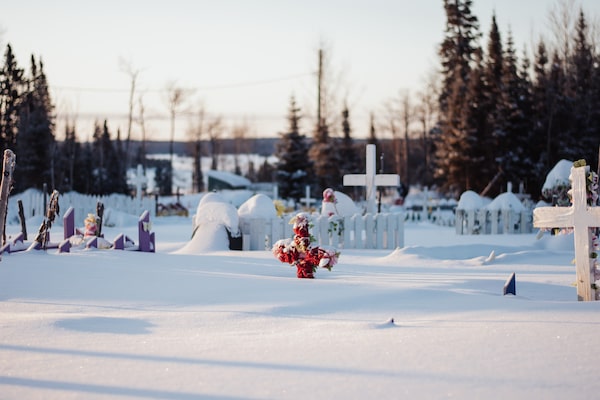
Betsy Linklater sits at home in Sandy Lake First Nation, where she spends much of her time making moccasins, beading and sewing.Willow Fiddler/The Globe and Mail
When Betsy Linklater gets the news that a community member has died, usually via a phone call or an announcement on the local radio, the 76-year-old elder of Sandy Lake First Nation puts aside whatever she’s doing and grabs her sewing supplies to go.
She meets her friends at the local radio station, where they will spend the next several hours preparing a variety of custom-made wreaths and traditional fabric dressings for the deceased person’s casket and body –often someone they knew and loved.
The group of elders – which also includes Damin Crow, Katie Fiddler, Lily Kakegamic, Evelyn Rae and Ethel Mawakeesic – have become known in the community as the Material Girls, a play on the Anishiniimowin phrase “oozsh zhee ghiz ih,” which loosely translates as “one who cuts things into shape.”
“As soon as they hear somebody passes away, they all know that it’s time to work, time to get together,” said Cyndie Fiddler, a band councillor who translated for Ms. Linklater in an interview.
Wreaths from the local Northern Store are stripped for their synthetic flowers to create a variety of new ones. One large wooden cross is wrapped with tin foil and smaller styrofoam blocks are wrapped with strips of white garbage bags before they are decorated with vibrant florals and leafy greens.
Metres of cotton fabric – usually pink for women and blue for men – are meticulously cut into floral designs, trimmed with lace, ribbons and rickrack, then stapled to skirt the wooden platform that will hold the casket.

A custom-made wreath sticks out of the snow at the Sandy Lake cemetery in February.Willow Fiddler/The Globe and Mail
For the deceased’s final journey, a pair of white leather moccasins are sewn with red linings, with a cutout known as a vamp, or azaazin in Anishiniimowin, applied to the top of the foot.
There are a few important rules that go along with the work, steeped in cultural beliefs, including that death is not to be anticipated or prepared for until it occurs. Former band councillor John McKay learned that quickly when he suggested purchasing enough materials and fabric for the year.
“You don’t do that because you’re inviting death,” said Mr. McKay, who was responsible for funerals, earning the humorous nickname The Undertaker, after the professional wrestler.
He said that during his term there were 30 to 50 deaths a year, sometimes two or three a week, before the pandemic. The work can be tiring and tedious, he said, but no one ever complained.
With no funeral homes in Sandy Lake and community members living both on and off reserve, the logistics of bringing bodies home for funerals and burials can take days, a process that is expedited when bodies remain in the community and can’t be embalmed.
There’s a system to the work of the Material Girls, said Ms. Fiddler, who has some experience as a younger member of the group. She said some of the tasks require a certain level of confidence to meet the standards set by the elder Material Girls.
She has also been on the other end, as a community member dealing with loss and grief, and still recalls the comforting presence of the group who gathered at her grandparents’ house years ago when her grandfather passed away. She sat with them, learning how to make an all-white cross dressed with white flowers.
“I remember that that helped me,” she said.

The Material Girls make a variety of wreaths as a show of respect and honour for community members who've passed away.Willow Fiddler/The Globe and Mail
While some customs have evolved – for example, the preparations no longer take place in the individual’s home but at the radio station – it remains a vital, honourable community service, Mr. McKay said.
“I imagine every community has those kind of people that volunteer, and it’s just a sense of serving their own community members.”
Eunice Keno said she was looking to make connections and friendships when she decided to join the Material Girls a few years ago.
An outsider from Northern Manitoba, she had heard the women on the radio, encouraging people to help them out. She finally decided to go, not knowing anyone, and was immediately welcomed by the late elder Sarah Fiddler.
In broken English, the elder asked Ms. Keno if she was there to help and quickly gave her instructions.
“Flowers here, break flowers. There’s water, drink water,” Ms. Keno was told.
Soon they were conversing in their shared Oji-Cree language.
“Everybody that comes to help has a job, and there’s no big or small task for anybody as long as you’re there to help and just start somewhere. If you see something that’s not done, then that’s what you need to do,” Ms. Keno recalled being told.
She said it has become a supportive, safe space for the women to process their own grief and often includes humour and teasing one another.
“There’s all these ladies laughing, and sometimes they have to stop and hug each other … because somebody broke down,” she said.
Selena King said she joined the Material Girls several years ago and helped make a wreath for a good friend who had died.
“It is like working for the deceased for the last time,” she said. “I would think of the person – would she/he like the colours and patterns? Will the family like how we made the wreaths, beds, cross?”
“We all have some sort of bond that is special and hard to explain.”